Business
Gig Harbor restaurants hustle, innovate, survive pandemic challenges
Chris Olsen says Fondi Pizzeria got a little COVID-relief money from the Feds, but didn’t tick enough boxes to qualify for the big bucks from the Restaurant Revitalization Fund.
John (“just John’’) says Kinza Teriyaki applied for a COVID-driven Paycheck Protection Program loan. He said he hadn’t heard much at all about the RRF, which dispensed grants that didn’t have to be repaid.
For his part, Gary Parker is proud that his BBQ2U Texas barbecue venture actually did well during the grimmest days of the pandemic. But because BBQ2U didn’t lose a lot of money, it didn’t qualify for the largesse coming out of the other Washington through the RRF.
In a state where nearly 3,600 restaurants have closed permanently over the last two years, these Gig Harbor owners and managers of independent local eateries have survived. They had to hustle and innovate: laying off employees, closing temporarily for weeks at a time, dropping indoor dining, relying exclusively on takeout, falling into debt. But — fingers crossed — they’re still here.
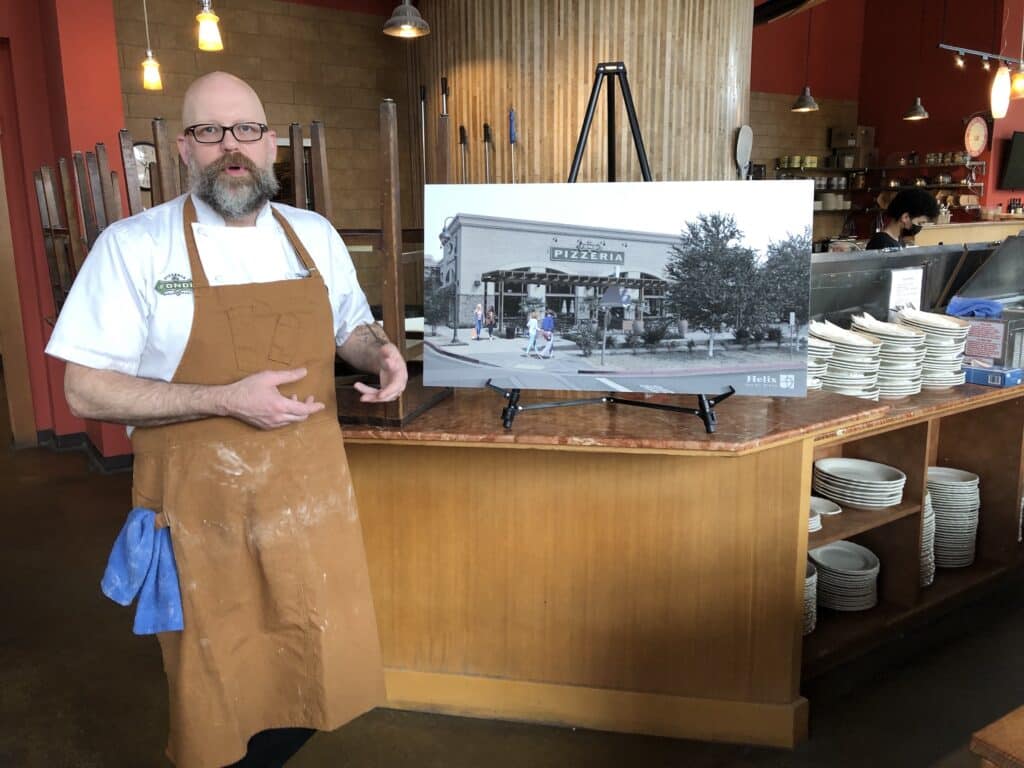
Fondi Pizzeria co-owner Chris Olsen said money from the Restaurant Revitalization Fund was needed, helpful and got the restaurant through a difficult time. Here he’s showing a drawing of improvements to come. Ed Friedrich / Gig Harbor Now
Restaurant Revitalization Fund fell short nationally
The star-crossed Restaurant Revitalization Fund was designed to help businesses like these. Launched in May 2021, part of President Joe Biden’s $1.9 trillion American Rescue Plan, the Fund, managed by the U.S. Small Business Administration, issued grants up to $10 million per business and $5 million per location to match the losses they suffered due to the pandemic. It burned through its $28.6 billion budget by June 2021 and closed.
The SBA did fund 105,000 restaurants ravaged by COVID that met its qualifying criteria. Unfortunately, 375,000 qualified restaurants applied. The Feds badly underestimated demand and messed up their messaging. The SBA has not explained how that happened in the eyes of its many critics.
A headline on a July 1 feature story in the New York Times summed it up this way: “Restaurant Grant Program Ends in a Cloud of Errors and Confusion.’’
Flawed or not, some local officeholders, in concert with Democratic lawmakers around the country, want to reboot the RRF and put billions more into a revived, beefed-up program. One of them is Gig Harbor’s Derek Kilmer, a Democrat who represents Washington’s 6th Congressional District in the House.
On Feb. 11, Kilmer, along with Rep. Marilyn Strickland, D-Tacoma, wrote a letter to Congressional leaders of both parties. In it, Kilmer and Strickland write, “In Washington, 3,989 restaurants did not get funding, a shortfall of more than $1 billion in our state alone.’’
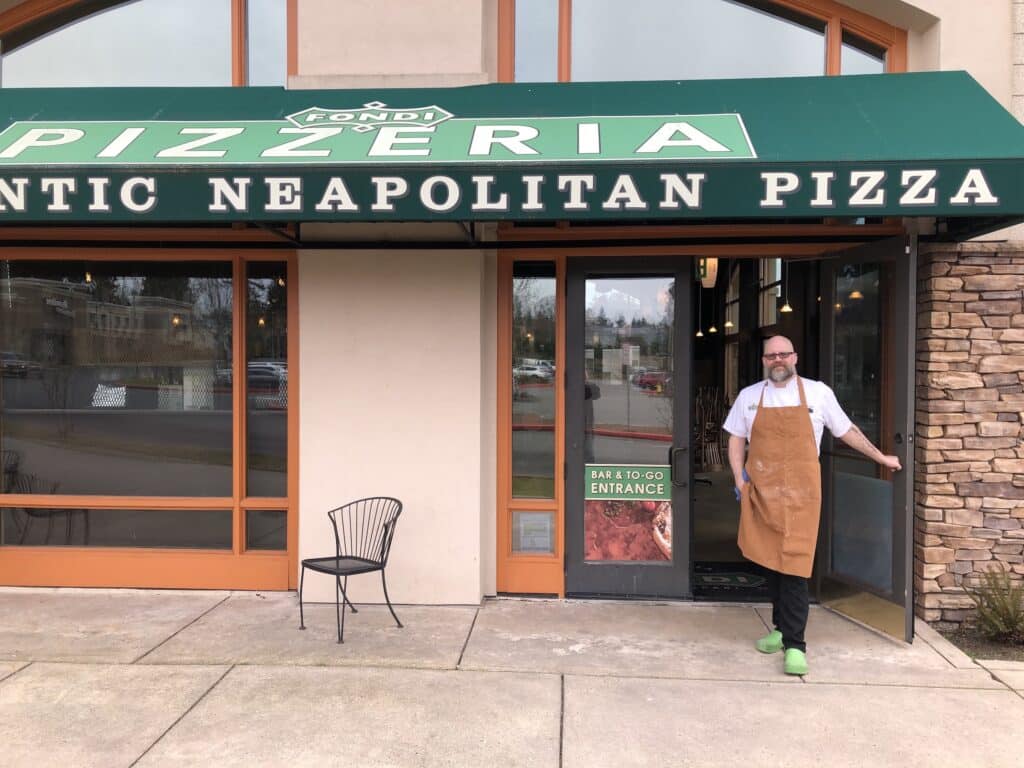
Fondi co-owner Chris Olsen said the pizzeria had to adapt, including going to takeout only for a while, but survived and recovered. Ed Friedrich / Gig Harbor Now
“Restaurants cannot afford to wait any longer,’’ Kilmer and Strickland argue. “This past fall, 243 restaurants in Washington state went out of business in addition to the 3,989 that previously closed during 2020 and 2021.’’
Reviving the fund, they say, could at least funnel badly needed dollars to businesses that qualified the first time around but never saw any money.
‘It was needed, it was helpful’
Pinpointing the number of Gig Harbor restaurants, if any, that closed because of COVID lockdowns and pandemic complications is evidently a matter of conjecture. Miriam Battson, president and chief executive officer of the Gig Harbor Chamber of Commerce, says the Chamber doesn’t keep figures on how many restaurants in the city have turned off the lights due to COVID. “We have no idea,’’ she acknowledges.
The Chamber works to lift eateries that are still here. According to Battson, the nonprofit business group makes extensive use of social media to heighten public awareness of Gig Harbor restaurants, adding that special emphasis is being put on Harborview Drive restaurants, some of which are struggling. She praises hard-working local restaurant owners for their resilience and ability to adapt in the midst of cascading crises.
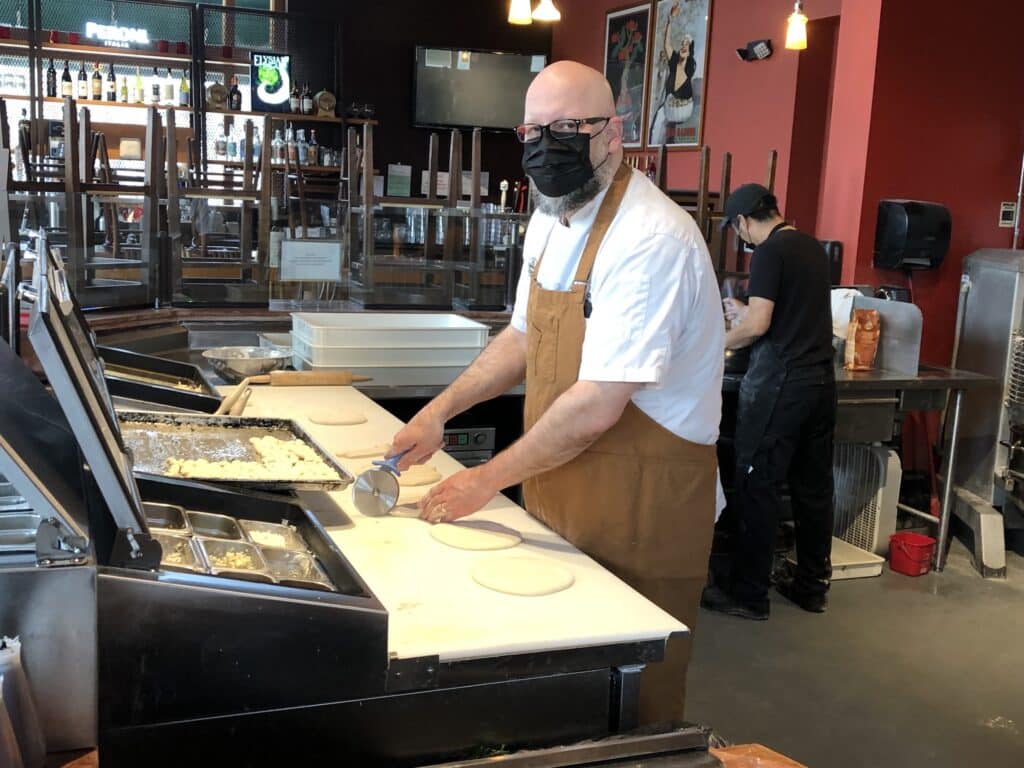
Co-owner Chris Olsen prepares food at Fondi, which survived COVID challenges, unlike about 4,000 restaurants in the state that closed. Ed Friedrich / Gig Harbor Now
Olsen, the Fondi Pizzeria co-owner, general manager and chef, says his popular Uptown restaurant, which has gradually built back to a full staff of 50 full- and part-time staff, weathered the tough early days of COVID in part with money from the Restaurant Revitalization Fund. “It was needed, it was helpful, it got us through a very difficult time,’’ Olsen remembers.
COVID also shut down the restaurant for three weeks in May of 2021. “There was a COVID outbreak in the management team,’’ Olsen recalls.
Asked how much Fondi got in COVID relief grants, he replied, “I’d rather not say.’’ Olsen characterizes the grants as modest in size. “We’re too large to qualify’’ for grants intended for small, independent operations, he says.
Olsen praises the Tacoma-Pierce County Business Development Office for coming through when it counted most. “They were calling and letting us know of funding opportunities. It far exceeded what we normally would have expected.’’
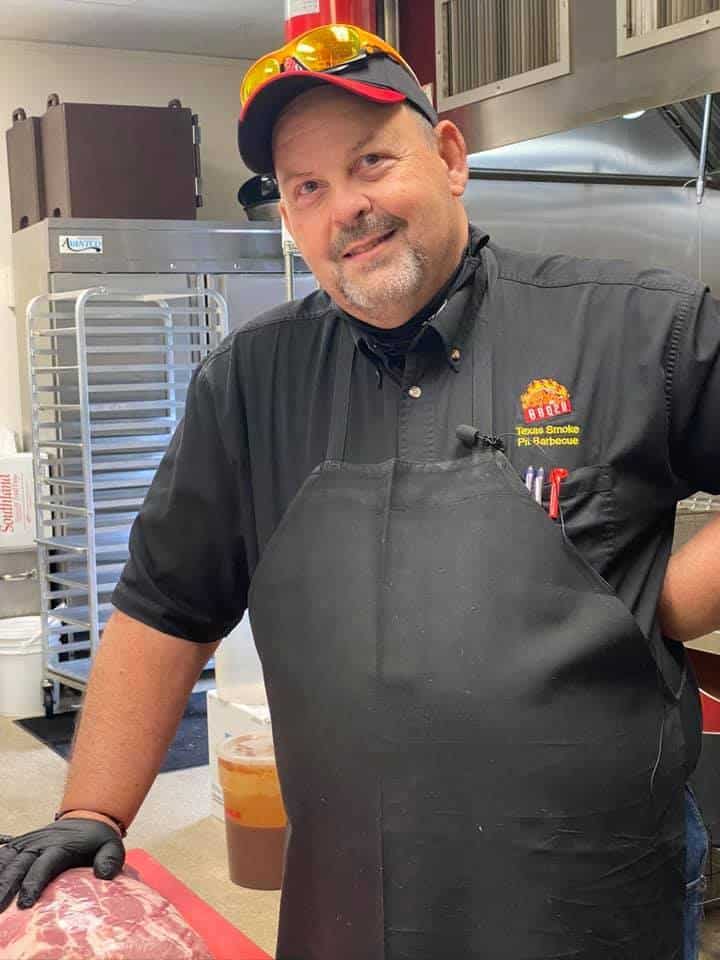
BBQ2U owner Gary Parker says his restaurant was one of a handful in Gig Harbor that stayed open throughout the pandemic. Photo courtesy of BBQ2U
Timely help was especially important for Fondi, an independent venture that spun off from a chain when financial stress hit its Seattle corporate parent. “We created our own corporation with local people here in the Harbor,’’ Olsen explains.
These days, Fondi, which temporarily switched to takeout only at its 4621 Point Fosdick NW store, is doing much better. “We did have to adapt,’’ Olsen said.
Indoor dining has resumed at the popular spot, which specializes in artisan, brick-fired Neapolitan pizza and a range of Italian dishes.
Even so, pandemic protocols remain in place. ”I follow the guidelines,’’ Olsen says. “We mask up, we distance. There’s no vaccine passport required, so we don’t do that.’’
Another thing that has changed is that Fondi’s part-timers, many of them high school students working their first job, have faced grief from customers infuriated by masking rules. He doesn’t think teenagers are well-prepared for such volatility, nor should they have to be, he says.
Gary Parker, the owner and pit master at BBQ2U, a Texas barbecue hangout at 4814 Point Fosdick Drive NW, has barely heard a discouraging word. Maybe that’s because succulent barbecue tends to make people happy. Or maybe it’s because Parker, who came to the Pacific Northwest from Austin, where he learned to master the smoker, spent a lot of time building goodwill in Gig Harbor since opening his restaurant in 2018.
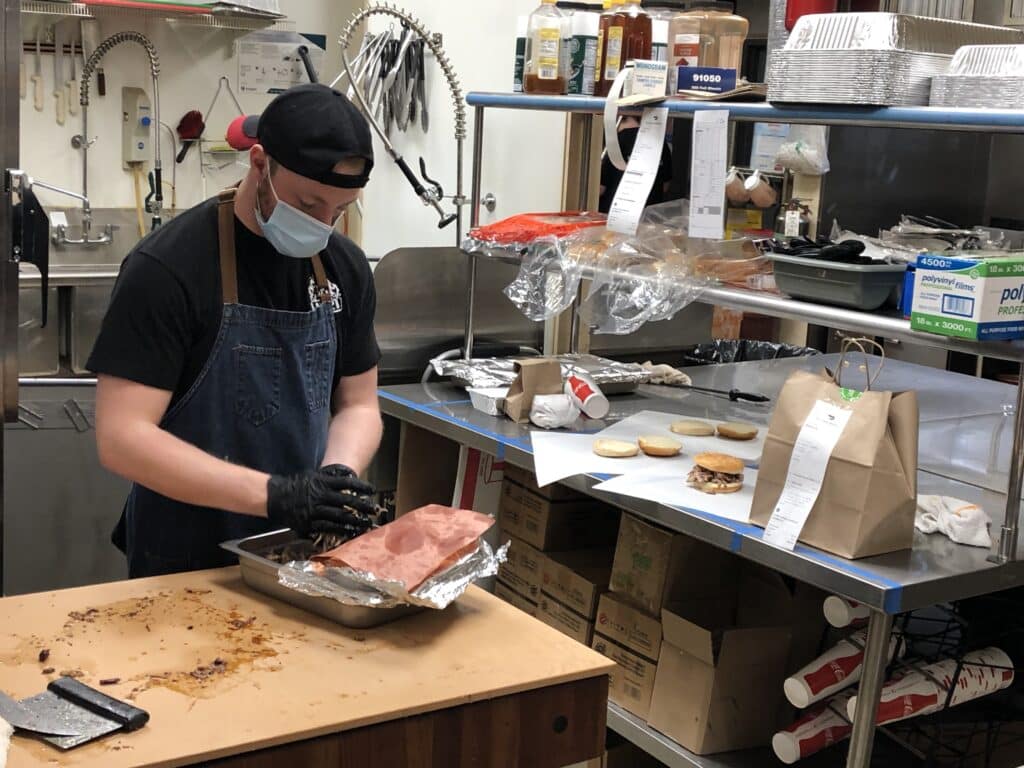
Aaron Johnson prepares food at BBQ2U, which wasn’t losing money so didn’t qualify for federal aid. Ed Friedrich / Gig Harbor Now
It might also be because his place was one of a handful — Parker says three — Gig Harbor restaurants that stayed open throughout the pandemic.
“We never shut down. We just kept growing,’’ he said. For a while, BBQ2U sent free brisket and cornbread lunches to shut-in seniors in cooperation with the Greater Gig Harbor Foundation.
When lines formed for takeout meals at the restaurant, Parker invited painters and authors to chat up the customers, giving patrons a look at their work in the process. The pandemic-born “Barbecue and Books’’ program is still going.
As a small, independent restaurant with a staff of nine, BBQ2U seemed a natural for the Restaurant Revitalization Fund. Not so. “We weren’t losing money, so we didn’t qualify,’’ Parker said.
Inflation, supply chain challenges loom
Parker seems to have handled past crises with aplomb. “The bumpy time for me is now,’’ he avers. “Inflation is kicking my butt. In meat, it’s 30%. Chicken comes in at 40%. As summer comes on, they’re going up again. You can’t expect me to raise prices that fast in my restaurant.’’

When lines formed for takeout meals at the restaurant, BBQ2U invited painters and authors to chat up the customers, giving patrons a look at their work in the process, and it continues today. On Sunday, Debra Rayne was there painting. Ed Friedrich / Gig Harbor Now
Supply-chain delays are another problem. “Supply chain, that’s huge. I spend so much of my personal time driving around, plugging holes,’’ Parker said. He doesn’t expect government to help with these problems.
”Politicians are morons,’’ he declares, frustrating showing. “I tell them that. Some of them come in here to eat. I say the problem is you guys are paradigm-driven.’’ The former tech engineer and tech executive (Intel, IBM) doesn’t see outside-the-box thinking coming from the bureaucracy.
John, the Kinza Teriyaki co-manager who didn’t want to give his last name, doesn’t have many good things to say about government programs, either.
“We’re just dealing with it,’’ he says of COVID, “with hard work, long hours and unreliable staff. You can’t expect them to work when they get free government funding for unemployment. We shut down for a month when Governor Inslee issued his orders. I don’t know what their intentions were because it shut down everything.’’
Family-owned Kinza Teriyaki is going all-in on takeout. “Indoors we don’t have any employees,’’ John says of the popular Japanese place on Kimball Drive. “It’s tough, he admits, but “we’ve been here in this community for 30 years,’’ in a voice that implies the restaurant is far from giving up.
“Local restaurants contribute to the vitality of our communities,’’ Rep. Kilmer emphasized in a statement. “They’ve been hit hard during this pandemic, so we need to have their backs so they can continue to provide good jobs. That’s why Congress should pass additional relief to replenish the Restaurant Revitalization Fund and provide critical additional support to local independent restaurants and the workers they support.”
